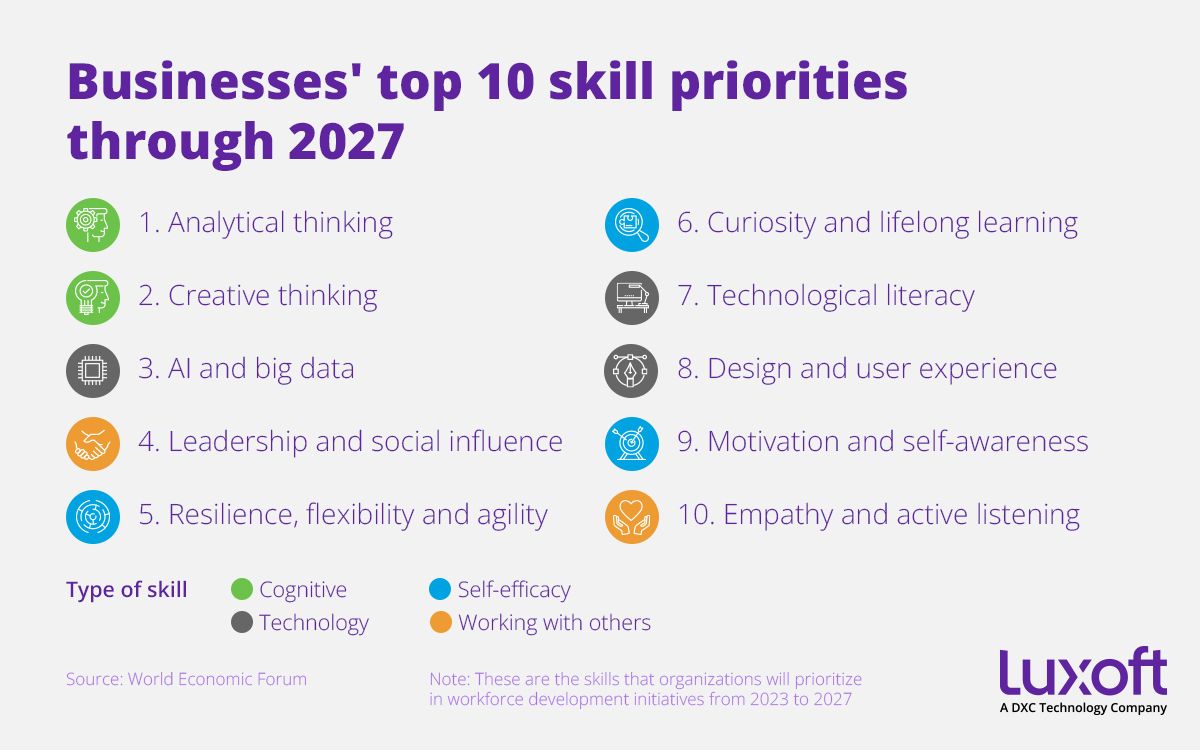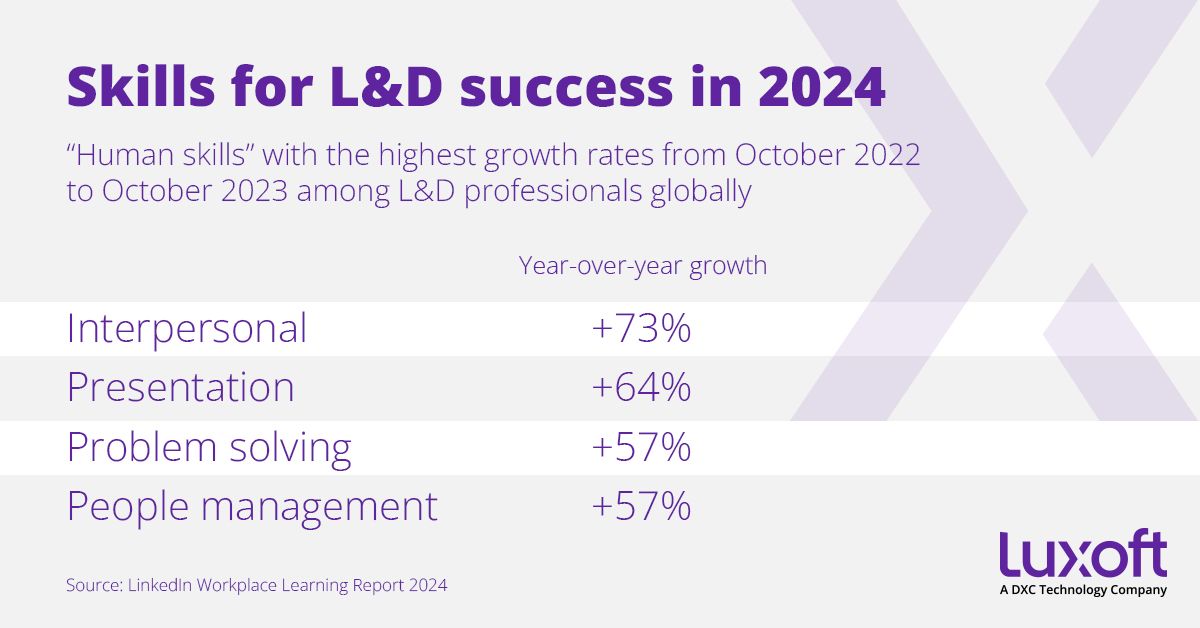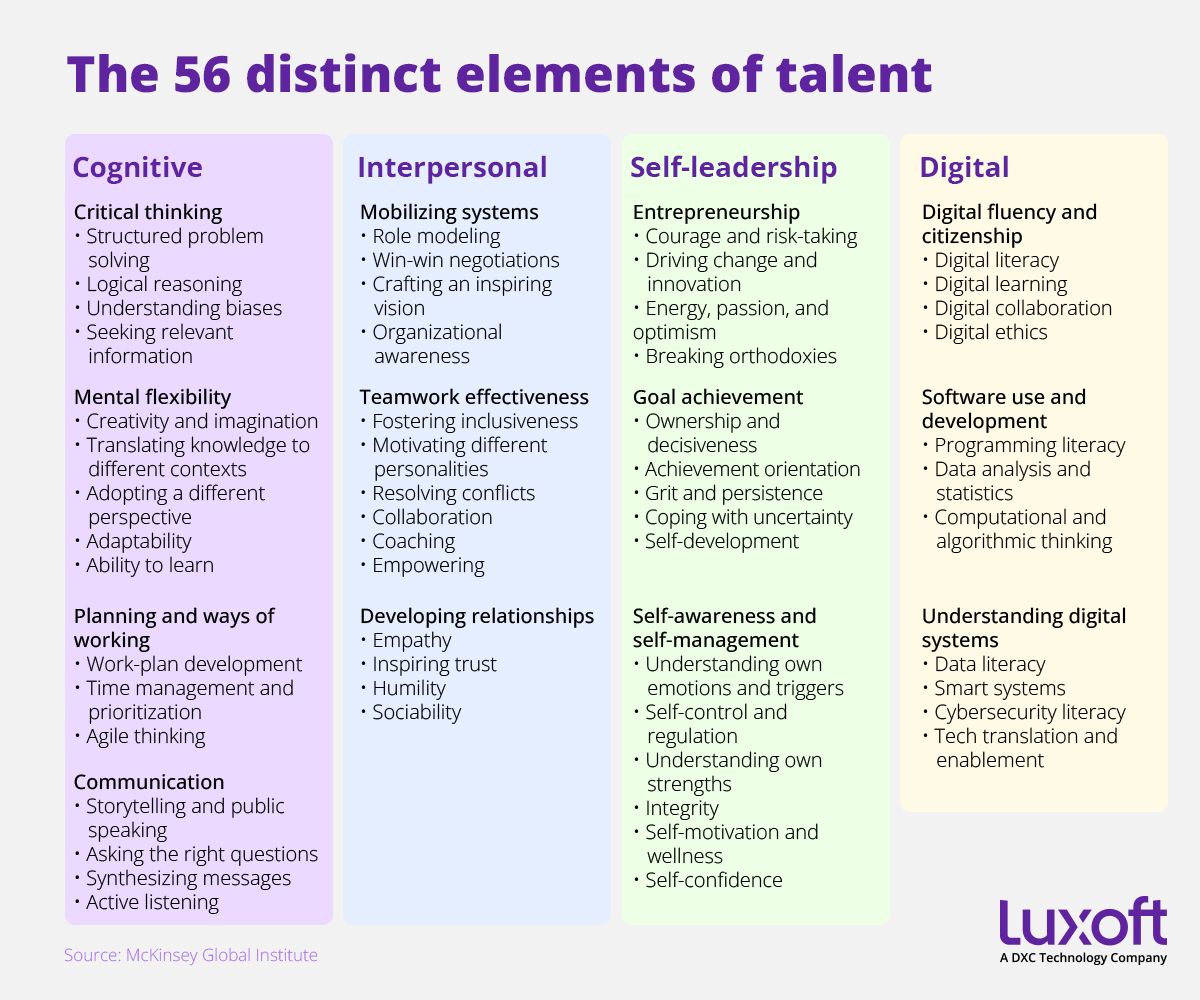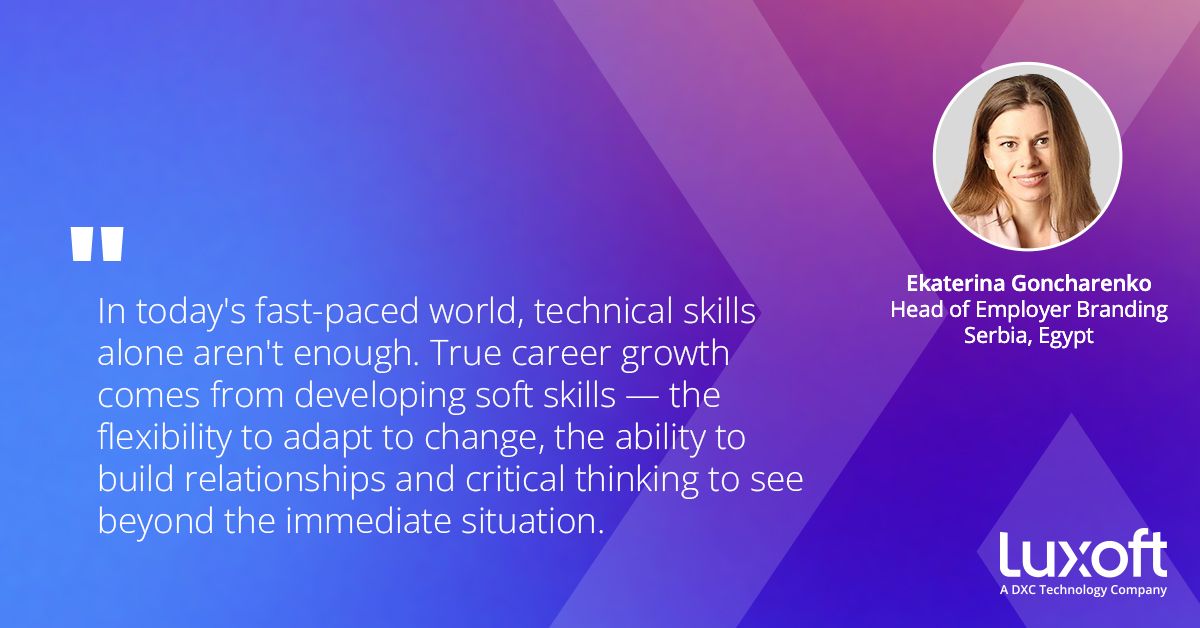
Soft skills for developers: Essential or optional?
In recent years, challenges like COVID, climate change and intensified migration have been testing the strength of the status quo. According to the World Economic Forum’s 2023 Future of Jobs Report, almost a quarter of jobs will change beyond recognition by 2027. Expecting your career to be a straight line is no longer possible, and adaptability — the ability to achieve results in ever-changing circumstances — is coming to the fore. The world is realizing the incredible importance of soft skills.
Read on to learn why professionals simply cannot afford to ignore soft skills and how Luxoft, a DXC Technology Company, is helping its employees develop them.
What are soft skills?
Soft skills are not directly related to a person's professional training but enable them to work more effectively and efficiently.
They are sometimes called “human skills,” since they remain the domain of people and not the AI models that are changing our industries.
Soft skills include creativity, the ability to resolve conflicts between team members, empathy and knowing when to show it, leadership and the ability to learn new things.
Why soft skills are in high demand
Amid the transition to a green economy and the increasing use of machine learning, the skill sets critical to success are changing. According to the WEF report, 34% of workplace tasks are already automated, and that figure will reach 47% by 2027. Robots will soon be replacing workers in industries around the world. At the same time, about 65% of employers believe they will have new openings in organizational sustainability, artificial intelligence and big data.
As the global labor market is transformed, professionals who can quickly learn new things and reorient themselves (upskilling and reskilling) will have greater opportunities. Flexible employees with well-developed soft skills have a huge advantage: they can take their skills with them into any field.
Which skills to focus on
According to the World Economic Forum, some soft skills are well ahead of trendy AI and big data on many companies’ lists of training priorities.
In a survey, businesses said they intend to focus on developing analytical thinking (48% of respondents) and creative thinking (43%) among their employees. Employers also cited leadership and social influence skills (40% of companies); resilience, flexibility, and adaptability (32%); and curiosity and lifelong learning (30%) as priorities.

A LinkedIn study provides more data. According to the 2024 Workplace Learning Report, 91% of L&D professionals are adapting their development programs to modern pressures and devoting attention to interpersonal skills, presentation skills, problem solving and people management. Between October 2022 and October 2023, the demand for these skills more than doubled.

But which particular skills will help professionals stay relevant? The McKinsey Global Institute set out to answer that question in a study from 2021. It predicted that manual, physical and basic cognitive skills will become less important as demand for technological, social, emotional and higher cognitive skills (creativity, critical thinking, decision making and complex information processing) increases.
Companies seem willing to adapt employee training strategies, but to do so, they must first figure out exactly what to teach. To that end, the study identified a set of 56 foundational skills that are already associated with greater employability, higher earnings and job satisfaction.
McKinsey first identified four broad categories (cognitive, digital, interpersonal and self-leadership) and divided them into 13 groups. For each group, the analysts defined “distinct elements of talent” (DELTAs) for a total of 56. Some are skills while others (such as "adaptability" and "coping") are better described as attitudes.

McKinsey concluded that mastering skills in self-leadership increases job satisfaction among respondents, with the greatest impact coming from self-motivation and wellness (23%), coping with uncertainty (20%) and self-confidence (20%).
The analysts found a correlation between higher income and the level of development of soft skills such as work-plan development (27%), organizational awareness (23%) and self-confidence (22%). The likelihood of employment correlated most closely with adaptability (24%) and coping with uncertainty (18%).
How Luxoft develops its employees’ soft skills
Luxoft provides free training and development opportunities for all its employees. Our training center offers more than 300 trainings and 17,000 e-courses as well as 90,000+ e-books and training videos. In 2023, more than 650 managers and team leaders learned new skills there.
Our training center's catalog includes technical, professional and language courses, plus trainings to boost soft skills. Luxoft also has partner training programs with Google, Microsoft and Amazon as well as provides employees access to the self-learning platform Udemy. Importantly, it’s not only employees who have access to this wealth of material; various courses are also available for an external audience.
Two programs in particular focus on soft skills: Leadership Academy Learning and BRIDGE Mentoring.
Leadership Academy Learning
This seven-month program is designed for team leaders and managers of small projects who have little experience in leadership. It helps participants bridge the gap between the behavior of an executor and those of a true leader, teaching them how to apply effective tools and methods in management roles.
The curriculum covers skills such as personal efficiency, mindful communication, motivation, the art of persuasion, conflict management and problem solving, and participants can immediately apply what they learn to the Luxoft projects they are managing.
BRIDGE Mentoring
Luxoft's mentoring program focuses on managers’ professional and career development. More experienced managers pass on knowledge to less experienced ones, helping the mentees boost their skills and achieve their goals.
The mentoring program is a great opportunity to boost management maturity at various stages of one’s experience and career. It is also the most natural way to generate a talent pool for further promotions within the company.
Luxoft considers investing in employees and their competencies to be of strategic importance. By fostering employees’ personal and career growth, we strengthen our position in an ever-changing market and increase our ability to turn new challenges into opportunities.

"I’m convinced that it’s impossible to grow in a career without boosting your soft skills. The speed of change is so high that, regardless of the industry, a good specialist needs to be flexible, able to reorganize and adapt to new circumstances. Another example is communication. Just being sociable is no longer enough. In business, you need to be able to build relationships with others, hear your partner, stay calm during a crisis and negotiate with people whose views may be pretty different. The third important skill, in my opinion, is critical thinking. You need to be able to analyze a situation, look wider and deeper than the immediate circumstances and think several steps ahead."
Ekaterina Goncharenko, Head of Employer Branding, Serbia and Egypt


